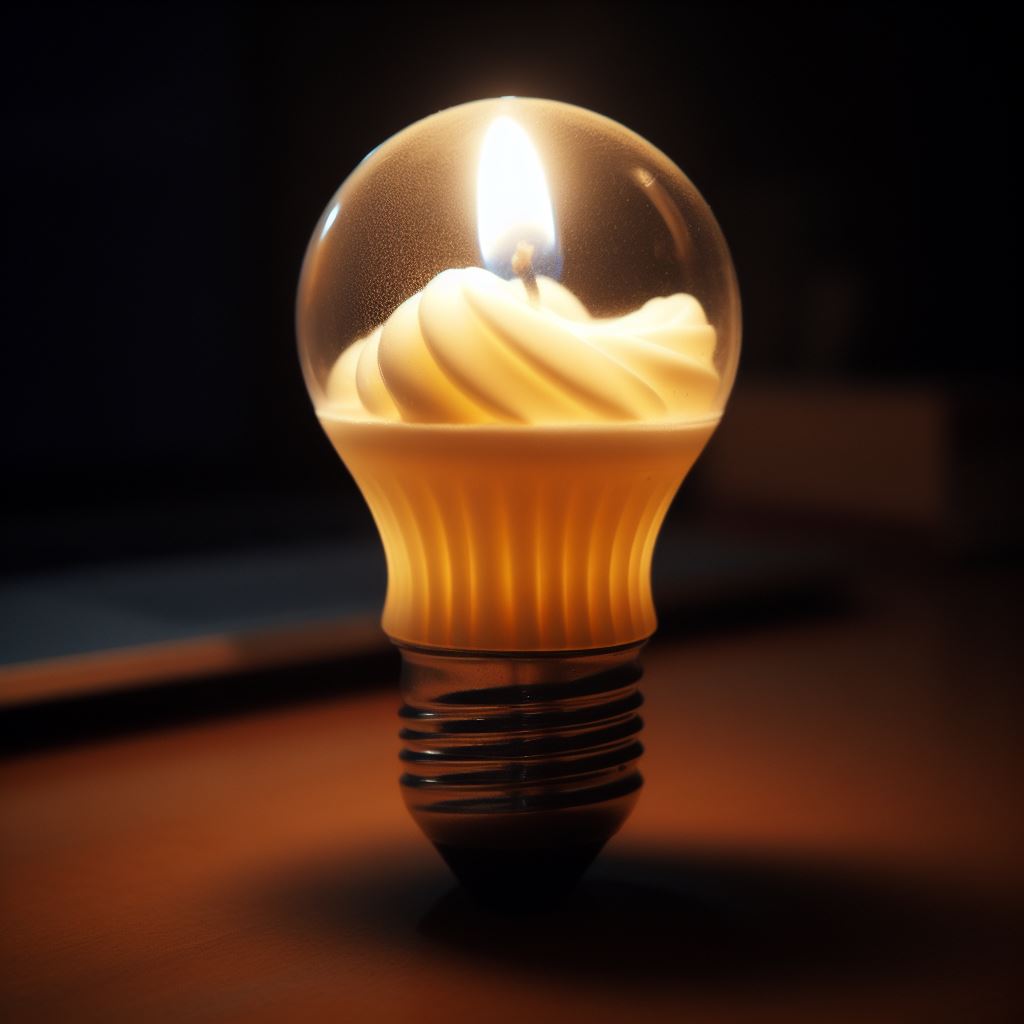LED Bulbs and Off-Gassing Odors
Welcome! You’ve come to the right place to learn about LED bulbs and their potential for releasing odours. Have you noticed an odd smell coming from your LED bulbs?
You’re not alone! Many people have experienced this strange sensation, ranging from a faint hint of something like burning plastic to a more pungent smell of chemicals.
You may wonder what is causing this odor and, more importantly, if it could harm you and your family.
In this guide, we’ll look at do LED bulbs give off an odor, how to reduce or eliminate any odours, and the potential long-term health issues associated with LED off-gassing. Read on to learn more!
Overview of LED Bulbs
LED bulbs, or light-emitting diodes (LEDs), are energy-efficient lights that use semiconductors to convert electricity into light.
They’re different from traditional incandescent bulbs, emitting light by heating a wire filament to a high temperature. LEDs are more durable and last longer than traditional bulbs, making them more cost-effective in the long run.
LEDs don’t have a filament, so they don’t heat up as much as traditional bulbs, which also helps conserve energy. This is why they’re often used in appliances and vehicles, requiring less power.
Additionally, because LEDs don’t release as much heat as traditional bulbs, they can be used in areas where they can’t, such as closets and other enclosed spaces.
Are Common Household LED Bulbs Susceptible to Off-Gassing?
Off-gassing is when volatile compounds are released from products, including LED bulbs. These compounds often take the form of tiny particles and can be seen as a mist or smell and potentially create an odor. This off-gassing can become more noticeable if not correctly taken care of.
This odor could occur for LED bulbs due to certain materials used during manufacturing, improper use, or incorrect disposal. Factors such as temperature, humidity, and air circulation in a room can also influence the potential of off-gassing smells.
LEDs emit very little heat compared to incandescent bulbs, meaning there is less potential for off-gassing. However, they are still on-limits from the possibility.
Read Also: Busting the Myth: Can LED Bulbs Explode?
LEDs vs Incandescent Bulbs
Compared to incandescent bulbs, LED bulbs are considered a safer option as they produce little to no heat, meaning that they are less likely to cause fires. LED bulbs are also more energy efficient, which can help lower electricity bills.
However, one aspect of LED bulbs that should be considered is off-gassing. Off-gassing occurs when chemicals in products such as LED bulbs evaporate as they age, which is responsible for an odour.
Regarding off-gassing, LED bulbs are typically better than incandescent bulbs as they contain fewer volatile organic compounds (VOCs).
VOCs are chemicals that evaporate and cause odors, meaning an odour is less likely to occur. This is excellent news since LED bulbs last longer than incandescent bulbs, so that they will release fewer VOCs over time.
Reasons Why You Might Notice an Odor From Your LED Bulbs
LED bulbs may emit an odor for a few reasons, such as incomplete manufacturing, incorrect disposal, or incorrect usage. Incomplete manufacturing of the LED bulb can lead to the off-gassing of volatile organic compounds (VOCs), which can become noticeable as an odour.
Incorrect disposal of LED bulbs can also cause them to release VOCs, which can smell. Additionally, LED bulbs used in enclosed or confined areas for extended periods can also produce odors due to the accumulation of VOCs.
The VOCs released from LED bulbs can include hydrocarbons, aldehydes, alcohols, and ketones – all of which have strong odours if present in large quantities.
Poorly manufactured LED light bulbs can contain higher levels of VOCs, meaning they may be more likely to emit odours than their correctly manufactured counterparts.
Read Also: How Far is the Right Distance for Your Light Switch?
Reducing Odors From LED Bulbs
LED bulbs are becoming increasingly popular due to their long lifespan and energy savings. However, many people do not realize they could emit odors from off-gassing. To reduce this potential odour, a few steps can be taken.
One of the best ways to reduce odours from LED bulbs is through proper disposal. Old LED bulbs should never be thrown in the trash as the components can contain hazardous materials. Instead, recycling the bulbs at a certified recycling centre is best.
The use of filters can also help to reduce or eliminate odors from LED bulbs. Many types of air filters are available on the market and can be used to capture pollutants in the air while also reducing odors. It is essential to replace the filter regularly to ensure effectiveness.
Conclusion
LED bulbs can be a great way to save energy and reduce your monthly electricity bill. However, knowing the potential for off-gassing odours with LED bulbs is essential. Properly disposing of old bulbs and using air filtration systems can reduce or eliminate odors from LED bulbs.
Types of LED Lighting
LED lighting has become increasingly popular due to its energy efficiency. LED (Light Emitting Diode) lighting does not contain chemicals like traditional bulbs and has a much longer lifetime span.
Several types of LED bulbs are available on the market. These include retrofit LED bulbs, directional bulbs, and integrated LED bulbs.
Retrofit LED bulbs are designed to fit into existing fixtures or lamps and are an easy way to update to LED without replacing the whole fixture.
Directional bulbs are meant to point light in specific directions, and integrated LED bulbs come with the fixture included, making installation easier.
Each type of LED bulb is susceptible to off-gassing, although the levels depend on the quality of the bulb and the manufacturer. Off-gassing is when chemicals in the bulb are released into the air, creating odours that can be smelled.
Read Also: Shine Bright! Can You Use Led Bulbs in Lava Lamps
Potential Long-Term Health Issues
When LED bulbs release odors, the particles and gases produced can harm your health. Long-term exposure to these particles and gases can lead to various medical problems, from asthma symptoms to allergic reactions. It is essential to understand the potential health risks associated with LED off-gassing and take steps to reduce the risk.
For example, keep the room well-ventilated using LED bulbs indoors. This will help reduce the amount of odor-causing particles in the air and reduce the possible health risks.
You can also purchase air purifiers or ventilation systems to help reduce the amount of toxins in the air.
In addition, take the time to research the LED bulbs you are considering before making a purchase. Look for LED bulbs that don’t have a heavy off-gassing tendency or have additional filters to reduce the number of odors released. This will ensure you get the most out of your LED lighting without endangering your health.
Outdoor LED Lights
LED lighting is increasingly becoming popular for outdoor applications as well. This is because LEDs use less power and can last much longer. However, they still have the potential for off-gassing odours.
This can be highly noticeable if the LED fixtures are in a high-traffic area, such as external lights in a home.
Since LED lighting is relatively new, knowing the potential for off-gassing odours is essential. The odors may be more apparent under certain conditions, such as when the LED fixture is exposed to strong sunlight or when the temperature drops suddenly at night.
The best way to reduce or eliminate odors from outdoor LED lights is to ensure that the fixtures are adequately ventilated and that any dust accumulating over time is removed regularly.
Read Also: The Glare Scare: Are LED Strip Lights Bad For Eyes
LED Lights in Cars
You may be surprised to learn that the potential for off-gassing from LED bulbs is not limited to the home. LED lights, from headlights to interior lighting, are also used in cars and can produce odors if not properly filtered.
The key to avoiding odors from your vehicle’s LED lights is to ensure they are fitted with an appropriate filter.
Most automotive LED lights come with a built-in filter that is designed to reduce off-gassing. The filter works by blocking out any potentially harmful fumes from the LED light to help you avoid any odors.
Some filters are more effective than others, so checking the filter’s specifications is essential when purchasing LED lights for your car.
Additionally, some cars have an air purifier installed as part of their HVAC system. This air purifier can help to reduce any odors from the LED lights, ensuring that your car interior stays fresh and odor-free.
Conclusion
LED bulbs are a great energy-efficient innovation in lighting, but it is still potential for them to release odors. It’s important to understand that off-gassing is an issue with many types of bulbs, not just LEDs.
However, due to their makeup and the materials used to create them, LED bulbs may be more susceptible to off-gassing than other light bulbs, such as incandescent ones.
To reduce the potential for odors from LED bulbs, it’s essential to dispose of them properly and to use filters in the workplace and home where the bulbs are in use.
Additionally, when shopping for LED lights, research the manufacturer and purchase products from reputable companies. By following these steps, you can enjoy the benefits of LED lighting without worrying about odors.
Resources and Further Reading
When it comes to LED bulbs, a great deal of information is available. Below are some resources and further reading that may be of help to better understand the potential for LED bulbs to slowly off gas and create odors:
- Energy Star Tips on LED Bulbs
- Consumer Reports Buying Guide
- EPA Article on Volatile Organic Compounds (VOCs) in Indoor Air Quality
- What Your Customers Should Know About Off-Gassing from Lighting
- Odours From LED Lighting
FAQs About Do LEAD Bulbs Give off an Odor
What are LED bulbs?
LED bulbs are an energy-efficient form of lighting using light-emitting diodes (LEDs) to produce light. LEDs use significantly less power than incandescent or halogen bulbs and last much longer, making them an ideal choice for commercial and residential use.
Are LED bulbs susceptible to off-gassing odors?
LED bulbs can off-gas or emit volatile organic compounds (VOCs). VOCs can be released from the materials of the lamp, such as the plastic housing or wiring, when the bulb is heated up, and cooler air is drawn in through small holes in the casing. These odours can vary depending on the type of LED bulb used.
What is the difference between LED and incandescent bulbs regarding off-gassing odors?
Incandescent bulbs have higher air leakage, releasing more VOCs and potential odors. LEDs are much better sealed, so there is minimal air leakage and thus less likelihood of off-gassing smells.
Are there any reasons why LED bulbs may emit an odor?
Generally, LED bulbs emit an odor when turned on due to manufacturing inlets or incorrect disposal. Odors can also occur when the bulb is exposed to heat, as this can create a leak in the sealant that holds the LED bulb together.
How can odors from LED bulbs be reduced or eliminated?
Proper disposal of old LED bulbs is essential, as this reduces the risk of odors. Filters can also be used to keep odors contained. Additionally, if the LED bulb is exposed to heat, it’s essential to allow adequate cooling time before turning it back on.
What types of LED lighting are available?
The types of LED lighting available include standard LED bulbs, high-output LED bulbs, halogen bulbs, and RGB bulbs. Each type has its potential for off-gassing and should be evaluated according to its application and the environment in which it is used.
What should I know about the long-term health risks associated with LED off-gassing?
Carbon dioxide, methane, and hydrogen sulfide are potentially harmful substances in LED off-gassing. Long-term exposure to these compounds can cause breathing problems, eye irritation, headaches, and skin issues. Taking caution when using LED lighting is essential, and proper ventilation should be provided whenever necessary.





2 thoughts on “Do LED Bulbs Leave an Unappealing Odor?”